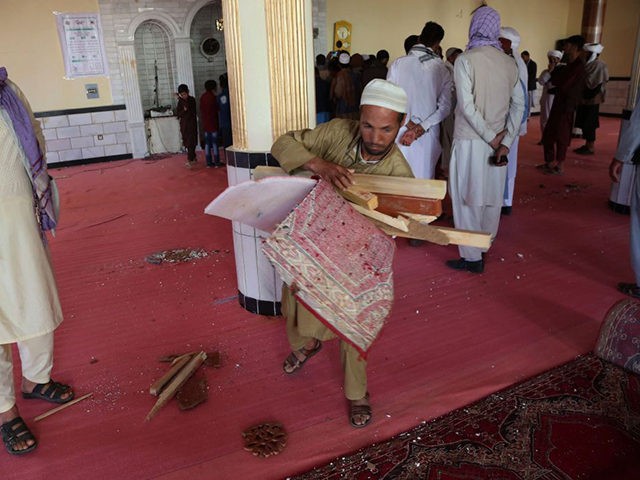Unidentified attackers bombed a mosque in Kabul, the capital of Afghanistan, on Friday, killing at least 12 people including the imam offering services.
The attack occurred on the first Friday prayers following Eid, the Muslim holiday celebrating the end of the holy month of Ramadan, and during a ceasefire between the government of Afghanistan and the Taliban jihadist organization brokered in observance of Eid. The Taliban has reportedly denied involvement in the attack.
Afghanistan’s Khaama Press identified the location of the attack as Kabul’s Haji Bakhshi Mosque and reported that another 20 people were injured in addition to the 12 confirmed dead. Death tolls in terrorism situations often increase following the immediate counts as some severely injured fail to recover. Khaama added that the explosion appeared to be caused by a bomb left on the premises unattended, not by a suicide bomber.
Zabihullah Mujahid, an official spokesman for the Taliban, condemned the attack on behalf of the organization on Twitter, publishing what appeared to be a photo of the body of one of the victims. He also blamed the government of Afghanistan for the attack, alleging it was part of a larger campaign against Islam in general. Afghanistan’s government is officially Islamic.
“Today, we strongly condemn the explosion in a mosque in [Kabul],” Mujahid wrote. “This barbaric act is part of a series of anti-religious crimes by the Kabul administration whose perpetrators will not go unnoticed, Inshallah.”
Warning — Graphic:
The family of the imam killed in the explosion, whom Tolo News identified as Abdul Aziz Mofleh, also reportedly implied that they believe the Afghan government itself may be responsible.
“[G]overnment leaders could be considered responsible for the death of a person whose murderer cannot be found,” Mohammad Sarwar, a relative of the imam’s, told Tolo News.
The Afghan government blamed the Taliban for the attack. Similarly, the Afghan government blamed the Taliban for a dramatic attack on a Kabul girls’ school last weekend that preceded the Taliban’s official call for a ceasefire through the end of Eid al-Fitr. The attack killed 85 people, among them many girl students; the Taliban has a long history of attacking schools that educate girls, asserting that the education of women is un-Islamic. The Taliban similarly denied involvement in the incident, however, and offered a ceasefire shortly thereafter. The ceasefire is set to end after the three days of Eid.
Regarding the attack on the girls’ school, the administration of President Joe Biden suggested a third potential attacker on Monday: the Islamic State. ISIS’s Khorasan Province (ISIS-K) has grown in prominence in Afghanistan since the fall of the parent organization’s “caliphate” in Iraq and Syria, often clashing with Taliban fighters as both attempt to expand their territorial control. ISIS has a long history of targeting civilians, particularly girls and Shiite Muslims generally.
State Department spokesman Ned Price urged the Afghan government to work with the Taliban against the Islamic State, assuming that the latter perpetrated the school attack.
“We are still looking into what or who is responsible, but I would note that ISIS has been responsible for similar attacks on Shia communities in Kabul in the past,” Price said at the time. “We note the Taliban has denied involvement in the attack, and we welcome their announcement of a three-day ceasefire over the upcoming Eid holiday.”
“We call on the Taliban and Afghan leaders to engage seriously in the ongoing peace process to ensure the Afghan people enjoy a future free of terrorism and of senseless violence,” he added.
Neither side has made any indication it is interested in engaging in cooperation. The Taliban, which refers to itself as the “Islamic Emirate of Afghanistan,” considers itself the only legitimate government of the country. The legitimate government, conversely, identifies the Taliban as a terrorist organization threatening the stability of the country.
The Afghan government has suggested that it would be interested in extending the Eid ceasefire further.
Abdullah Abdullah, the head of the Afghan government’s team seeking an end to the 20-year war, called the ceasefire as proposed by the Taliban insufficient and expressed Kabul’s will to see a more prolonged period of cessation of violence between Afghan forces and the jihadist organization. Tolo News also reported on Wednesday of the existence of popular demand among Afghan citizens for an end to the violence.
The increase in civilian violence in Afghanistan follows the announcement in April by President Joe Biden that he would prolong the Afghan War another four months through September 11, 2021. Predecessor Donald Trump had brokered an agreement with the Taliban to withdraw all American forces from the country by May 1, 2021, in exchange for the Taliban ceasing attacks on American troops and cutting ties to international terrorist organizations like al-Qaeda. Following the announcement, Biden’s secretary of state, Antony Blinken, issued repeated assurances that the American government would remain heavily involved in Afghanistan in a civilian capacity following its military exit.

COMMENTS
Please let us know if you're having issues with commenting.